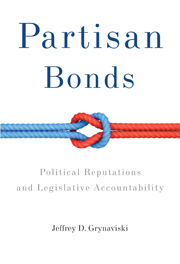1 - Introduction
Published online by Cambridge University Press: 05 May 2010
Summary
The success of representative democracy as a political system arguably hinges on the ability of the electorate to replace elected officials who fail to act in the public interest with others who will. This sort of democratic accountability requires (1) that ordinary citizens be able to pin credit or blame on the correct set of incumbent officials for their policy choices and (2) that citizens must reasonably believe that challengers will perform better in office. Neither of these conditions is trivial to satisfy. Identifying whom to hold responsible for government performance is virtually impossible, because passing laws is a team effort where individual contributions are often unobservable and disagreement among legislators makes it inappropriate to hold the entire chamber accountable. Meanwhile, challengers, by virtue of being out of office, have a difficult time providing credible signals about how they would act if they were in an incumbent's shoes, especially in light of the fact that voters know that office-motivated candidates have incentives to say whatever it takes to win elections.
Classic scholarship identifies political parties as offering a possible solution to both of these problems (Lowell 1913; Schattschneider 1942). Woodrow Wilson (1900), for one, argues that in cabinet governments (i.e., the Westminster system), parties act as unified teams because party leaders have the ability to dissolve the government and to expel defectors from the party (see also Huber 1996; Diermeier and Feddersen 1998).
- Type
- Chapter
- Information
- Partisan BondsPolitical Reputations and Legislative Accountability, pp. 1 - 14Publisher: Cambridge University PressPrint publication year: 2010

